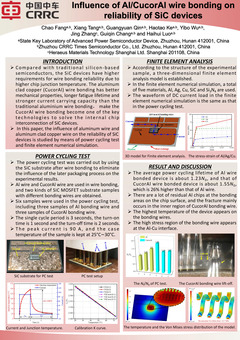Influence of CucorAl wire bonding on reliability of SiC devices

Start Time:Pending (Asia/Shanghai)
Duration:Pending
Session:[No Session] » [No Session Block]
Abstract
Keywords
Speaker
Fang Chao
engineer Zhuzhou CRRC Times Semiconductor Co., Ltd.Chao Fang received the B.S. degree in Mechanical engineering and automation from Shanghai University, Shanghai, China, in 2015, the M.S. degree in mechanics from the Institute of Electronics Packaging Technology and Reliability, College of Mechanical Engineering and Applied Electronics Technology, Beijing University of Technology, Beijing, China, in 2019.
His current research interests include the development of high-power electronic devices, especially focused on the development of IGBT modules for automotive applications.






Comment submit